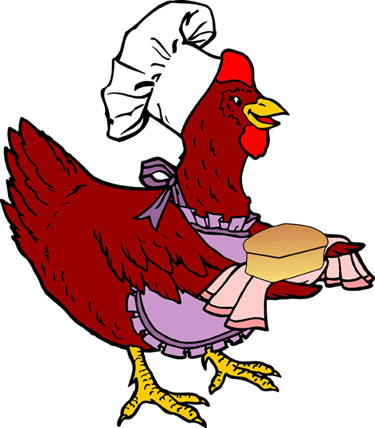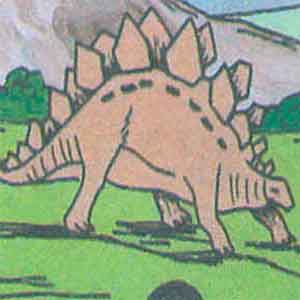
I love traditional folktales: Rumpelstiltskin, Cinderella, Sleeping Beauty, Little Red Riding Hood. Maybe it’s the visuals – all those deep dark forests, turreted castles and medieval townscapes. Maybe it’s the blunt dichotomies of rich/poor and good/bad. Or maybe it’s the magic. These simple stories have a mysteriously universal appeal that somehow transcends both centuries and cultures. But there’s always an exception, and for me it’s that horribly self-righteous nag, The Little Red Hen.
Just in case you’ve forgotten her, she’s the hen who finds some grains of wheat. She asks the cat, the dog and the rat if they would like to help her.
“Who will help me plant the seeds?"
"Not I," barked the lazy dog .
"Not I," purred the sleepy cat .
"Not I," squeaked the rat."Then I will," said the little red hen.
She plants, harvests, mills and bakes all by herself.
When the bread is baked, however, they are happy to help her to eat it.
“No!” she says, “I did all the work and I shall eat it all by myself.”
I dislike the story because of its didactic sledgehammer, but if I’m really honest, I just really don’t like her. As a person. She’s mean-spirited and whiney, bossy and smug. And worst of all, she wallows in her self-martyrdom. In case you think me uncharitable, think about this. Did she explain to the other animals at the start that she was planning to make bread, in order to incentivise them? No, she didn’t. She kept her plans to herself like a control-freak. Or did she explain that she really needed help? No, she didn’t. Did she set out the possible consequences of their decision? No – she conned them into thinking they had a real choice. Why? Because she planned this little lesson all along. And worst of all, they are given no chance to redeem themselves or to make it up to her.
I feel a bit better now I’ve got my hatred for the Little Red Hen out into the open. I was reading the story with the children the other day and it hit me like a lightning-bolt. I closed the book, and it just slipped out: “I think she’s wrong”. The kids looked at me in surprise. We don’t have sacred texts of any description in this house, but I suppose fairytales are usually accepted unquestioningly. At first, they just defended her against my charges. “She did all the work”, “they were lazy” and “It wouldn’t be fair to share!". But then they opened a mental door. “It’s good to share”, “We should do nice things for people whether they deserve them or not” and then my favourite, “maybe the other animals did lots of other things for the hen”. The floodgates were well and truly open.
We invented multiple scenarios. Imagine if the other animals were really good at something the hen didn’t understand, like science or art? Or they were exhausted after a day’s work elsewhere? Maybe the poor put-upon hen had tried and tried to get them to pull their weight but was always taken advantage of. Or did they have a previous bad experience working with bossy Hen? Who was looking after the children? What age were the other animals? Were they disabled or ill? Who usually provided the food? Did they live together? We could have argued it back and forth all day. Kids might not understand the terms ‘moral’ or ‘ethical’ but they have a very finely-tuned sense of fairness.
People often worry about there being a moral vacuum left by the absence of religion in raising children. Less a value judgement on our own morality, but more an uncertainty about finding the opportunities to discuss matters of conscience without the framework of religion around us to prompt us. In actual fact, we are in the ultimate position to develop their ethical radar, simply because of our freedom to question. For us, there isn’t one text from which to derive values, but a whole world of questions waiting to be asked. From fairytales alone, there are springboards galore: Were Hansel and Gretel right to murder the witch? Should Goldilocks have got away with trashing the bears’ house? Or how about a discussion about fairytale princesses and the role of women?
I have since read that the story of the Little Red Hen has been repeatedly used as political ammunition by the right wing, most famously by Ronald Reagan in 1976. It’s the perfect tale of individualist capitalism, and anathema to the principles of welfare. Why should the hard-working little red hens of this world slave away to provide healthcare, education and unemployment benefit for the wasters in the barnyard?
But as a full-time mother myself, I can’t get her out of my head as a maternal figure. She feels hard-done-by and underappreciated, unpaid and overworked. She’s bitter. And it’s as a humanist mother that I disagree with her most. Of course the kids should be helping her. Isn’t it one of her many duties to support their independence and sense of communal responsibility? Don’t they need to know how to plant and mill and bake? And wouldn’t it be better for their bodies and minds than sitting around doing nothing all day? She needs to encourage and inspire them, and to make the implications and consequences of their actions clear to them. But most of all, they need the chance to redeem themselves.
If I were to write a new ending, it might go something like this:
“I did all the work, so I should eat the loaf myself,” said the Little Red Hen.
The others thought for a little while.
“I know!” said the eldest, “I could go to the shop and get some jam!”
“I could wash the dishes afterwards,” said the second.
“And I can set the table” said the little one.
“Very well” said the Little Red Hen with a smile, “I don’t like eating on my own anyway”.

